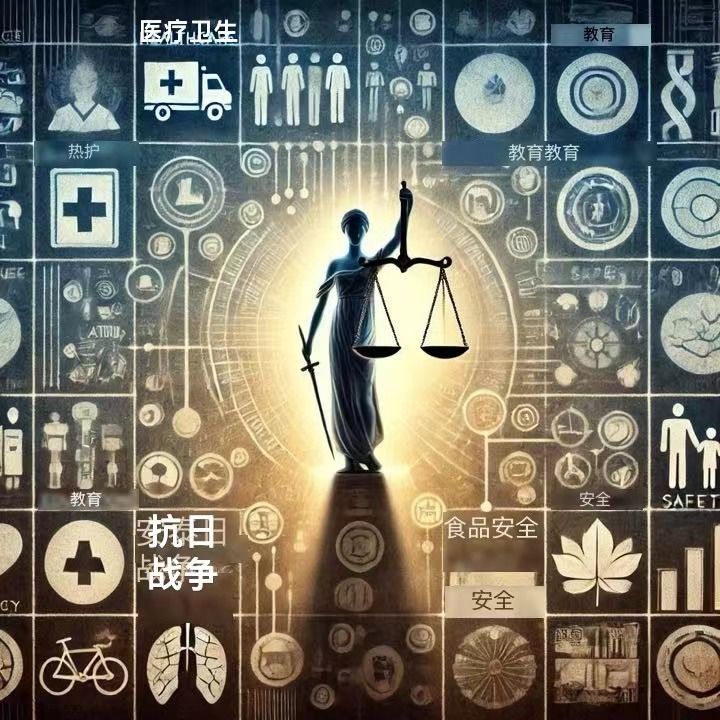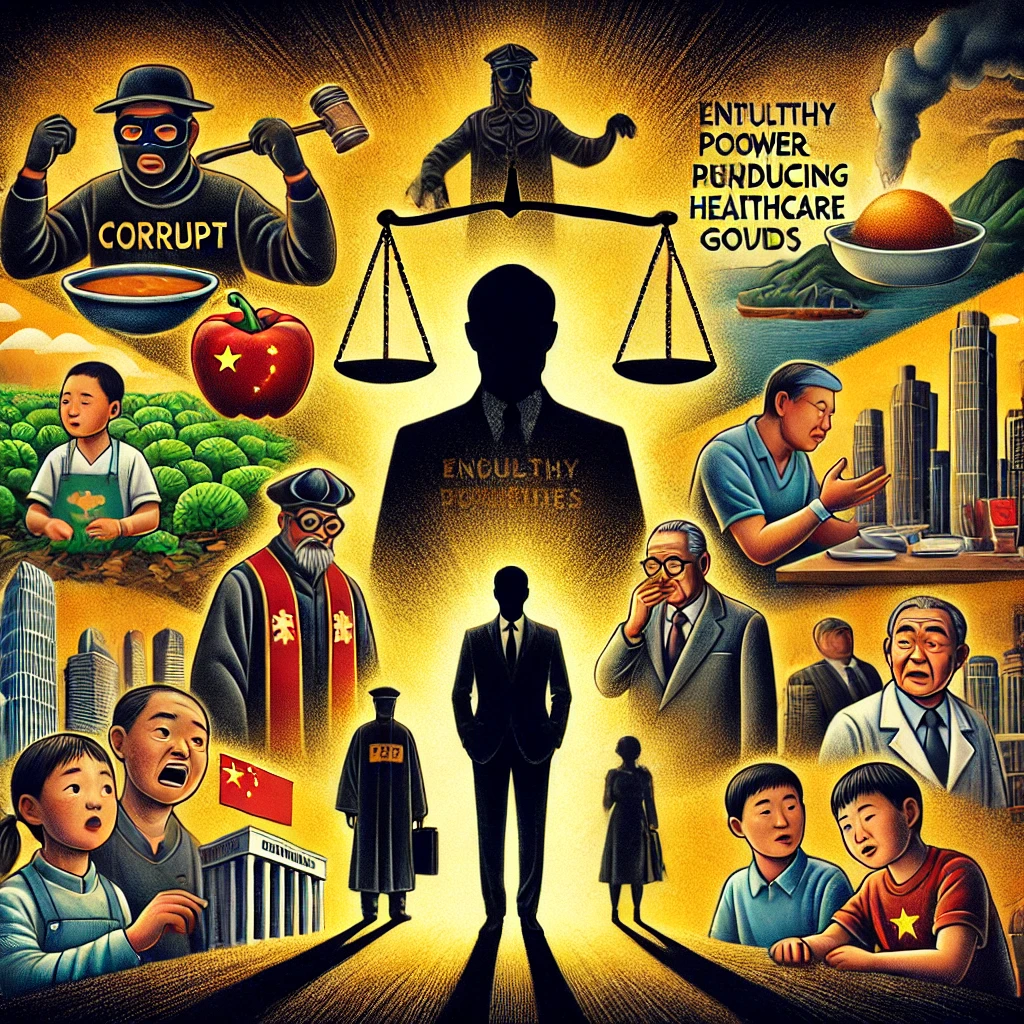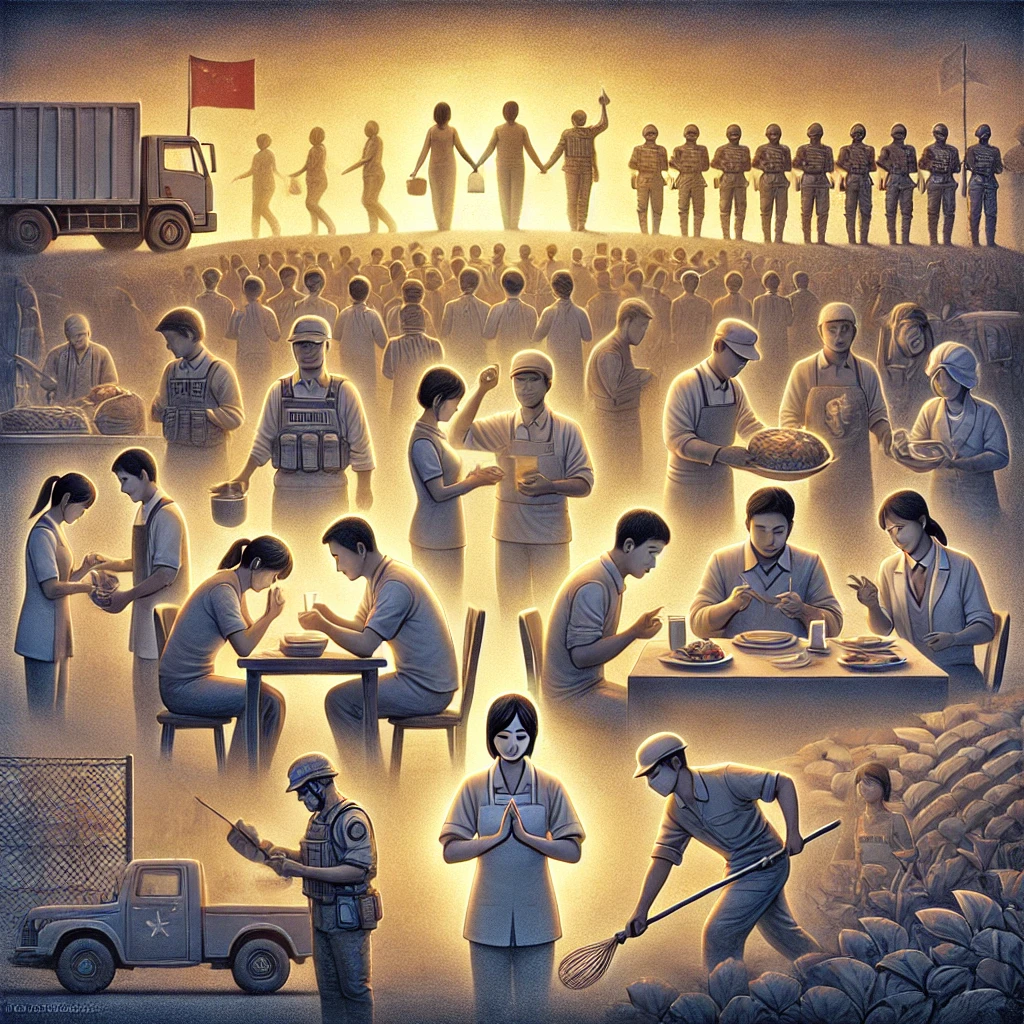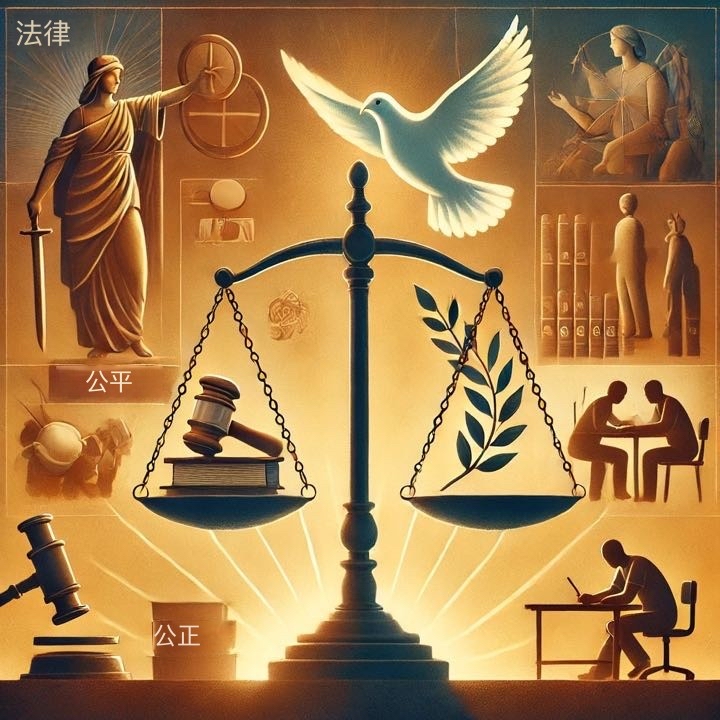本文阅读基础:在中国,虽然爱国主义情感长久以来都与抗日战争的记忆紧密相连。然而,在党的三次党代会上分别重申了国内主要矛盾,分别是人民对于建立先进的工业国的要求同落后的农业国的现实之间的矛盾(党的八大,1956年)、人民日益增长的物质文化需要同落后的社会生产之间的矛盾(党的十一届六中全会,1981年)、人民日益增长的美好生活需要和不平衡不充分的发展之间的矛盾(党的十九大,2017年),这些论点已经从国家层面终结了抗日战争期间以中日矛盾为主要矛盾的时期,1972年9月29日,双方签署发表《中华人民共和国政府和日本国政府联合声明》,实现邦交正常化。
今天的中国已进入一个全新的时代,面对的是全球化的竞争与自身内部的诸多问题。我们不仅要铭记历史,反思过去的战争创伤,更重要的是,如何在当下复杂的社会中找到更急迫的行动方向。今天,我们是否更应该延续解放前将抗日作为主要矛盾,即‘抗日plus’(本文特指战争结束后身体离开了战场而灵魂依据在继续战斗的状态),还是认真解读当前主要矛盾的论述,各行各业认真解决发展中的问题?即抗奸腐奸商?第三,作为基督徒需要思考的是,仇恨能否解开‘抗日 plus’的状态?这关乎我们每一个国人如何活出自己健康、快乐的人生,本文的一些思考还有附在后面的参考资料供弟兄姐妹们阅读。
1、抗日plus——爱国情感的延续
抗日是中国历史中重要的篇章,它象征着中华民族面对外来侵略时不屈不挠的精神。然而,今天的中国与当年的情境已经截然不同,中国共产党在不同的历史阶段也均将主要精力转移到了关乎民生的问题上。虽然历史不能被遗忘,但一味沉浸在对日本的仇恨和对过去的情感中,可能会使我们忽略眼前更为紧迫的现实问题。在二战期间其他东南亚国家很多被日军侵占掳掠,尤其是菲律宾深受其害,但这些国家无不将目光聚焦至人民生活水平和国力提升的努力中。过度强调历史仇恨,有时会成为这些国家无法前行的包袱。
爱国不仅仅是对过去的缅怀,更是对当下生活的责任。思想抗日期间的爱国主义情感固然重要,但实际意义上的爱国更应该从爱自己、爱身边的同胞开始,认真对待自己的生活和社会责任,并对自己的同胞贡献美好的工作成果,而不是残害老一辈革命家拼死打下江山的人民群众,对他们寄予美好愿望的父老乡亲及其子孙后代下毒手-----把化学药剂加入食品、奶粉,哄抬救命药品价格、贩卖他们的儿女和器官,甚至连死后遗体也要利用。如果一个社会只关注外部的仇敌,而忽略了自身内部的问题,那这个社会的进步就会受到严重阻碍。

2、抗奸腐奸商——面对当今社会的挑战
当我们审视当今的中国,除了历史伤痛外,执法阶层内部的腐败、执法人员不作为、乱作为,以及各行各业中的违法乱纪现象整治不力同样值得我们深思。在当今社会,奸腐奸商不仅仅指公开定性的涉案人员,各行各业的违法乱纪、损害人民利益者也是奸腐奸商的现代化身。
- 不作为与乱作为的执法者:执法本应是维护社会公正的基石,但有些执法者滥用权力,损害人民利益,甚至利用自己的‘特色’性质掩盖问题,这些行为严重侵蚀了人民对法律和执政人员的信任。
- 制造、贩卖有毒有害食品的从业者:在食品安全问题上,越来越多的企业为了追求短期利益,漠视公共健康,制造和加工有害食品,从奶粉、饮料到蔬菜粮食一应俱全,越来越多的人身体健康出现问题。
- 医疗系统商业化的乱象:商业化让某些医院和医务人员将患者当成牟利工具,背后的决策者和推动者也为此推波助澜,导致医疗资源不公平,伤害着无数家庭。
- 被利益集团洗脑的教育体制:教育者不教导学生独立思考、批判性思维和逻辑思维能力,而是以利益集团为导向,忽视了教育应有的自由与公正,扼杀了孩子们的创造力和独立人格。
这些奸腐奸商遍布社会的各个角落,他们的存在使得整个社会失去了信任感,阻碍了真正的进步。因此,抗奸腐奸商并不是历史责任,而是我们每个人今天必须面对的现实挑战。只有直面这些奸腐奸商,打破不公与奸腐,社会才能真正实现进步。

3、i爱仇敌——活出基督信仰的自由人生
耶稣教导我们要爱仇敌,这不仅仅是一种宗教信仰的行为准则,更是一种超越现实困境的智慧。爱仇敌并不意味着软弱或妥协,而是要求我们用宽容和理性战胜仇恨与愤怒,找到真正的内心自由。
当我们面对社会中的奸腐奸商时,愤怒和仇恨可能是最自然的反应,但愤怒不能解决问题,反而会让我们陷入情绪的泥潭。爱仇敌是一种更高层次的选择,它意味着我们要在遵守法律、行公义的同时,保持内心的平和和仁爱。
抗日plus是利益集团驱使的‘工具人’式的爱国,是狭隘的、短视的、缺乏逻辑思考的爱国版本,作为一个神所造的‘自由人’,首先要做的是爱自己和身边的同胞,不是作为‘工具人’去爱,而是通过自己的工作造福他人、通过自己所种的蔬菜和粮食造福社会、通过自己的执法体现出执政者的公平公正、通过自己对病人的医疗体现出‘治病救人’的宗旨。
抗奸腐奸商的实质是爱社会、爱公义和公平,有了这样的爱,很多人可以脱离狭隘的‘工具人’角色,才会理解‘一衣带水’的那个国度即是战争的发起者也是战争的受害者,他们中的绝大多数人在这70多年所做的是‘迅速崛起’,造福一方。如此,我们便会同时理解‘爱仇敌’和‘眼光向内’提升自己各方面软硬实力的理由,才能在这复杂的社会中保持独立、平和与强大。
换个角度说,爱仇敌不是对敌人罪行原谅与否的妥协或放弃,这是神的职责,但却是国人正确审视自己的前提基础,没有这样的心志也无法活出人生的自由。
4、做好眼前的事情,学习他人的优秀
今天的国人,应该更多地关注如何在自己的岗位上做到最好,如何在自己的生活中做到守法、守德。抗日的历史情感不能成为我们忽视现实的借口,而抗奸腐奸商才是我们当下更为迫切的任务。面对那些破坏社会公平正义的人和事,我们除了通过法律途径来维护自己的权益外,让自己手中工作充满对他人的关爱、让自己做的食品有益于他人健康、让自己的病人感受到人与人之间的温暖、让自己的执法对象体验到法律法规的公正和温度......。
很多人去美国、日本等国后是不是感觉自己的三观甚至五官都要颠覆了?越来越多的人晚上7点不再看电视新闻而是改刷手机了解世界了,所以我们要做的不是‘抗外敌’而是‘抗内鬼’,不是抵制而是虚心学习他人的长处,别让出国长见识的钱打了水漂。

当我们指责今天的老人是文革那批‘革命小将’变老的时候可否想到,当时的‘大环境’剥夺了他们在本可以获得‘关爱’的年纪却被利益集团无情的剥夺了,以至于‘永远’失去了爱‘邻舍’的能力?
当我们指责那些打杂日系车、持凶器试图屠杀在华无辜日本人的时候可否想到他们是受到了怎样的教育才会在‘食不果腹’、吃着有毒食品、喝着有毒饮料,因着高昂医药费放弃治疗的情况下将这些‘仇恨’发泄到70年前那批人的后代身上?
看到这样的消息时,总能让人想到一句中国俗语:“一俊遮百丑”。是啊,当抗战胜利后的70多年里我们依然以‘抵、杀’日本人为‘俊杰’可以遮这些涉及民生的‘丑s’时,那些抗战英雄存在的意义是什么?是成为另一个人民眼中反对派的挡箭牌吗?
很多毕生在国内‘爱国者’可曾想到我们今天的一切除了革命先烈的努力外还有许多战后国家在给予我们热情的支持与帮助?如果不放下自己心中的‘恨’,怎么去理解那种超越地域的爱呢?
点到为止,下面是几点建议:
倡导并维护法治,让每个人在法律面前真正平等。法律不仅是对外的工具,更是我们每个公民在面对内部不公时的保障;面对社会中的不公,我们不能沉默,通过合法的渠道、理性的声音,我们要发出对社会公平的呼吁,让奸腐奸商无所遁形;无论我们从事什么行业,都应秉持职业道德,拒绝任何形式的欺骗、贪腐和违法行为。每个人在自己的岗位上行公义,就是对社会最大的贡献;无论是基督徒还是其他信仰者,我们都应当在生活中体现出信仰的力量。爱仇敌并不是对奸腐奸商的纵容,而是用法律与公正回击恶行,同时保持内心的平和与坚定。

结语
无论是谁要求我们爱国,其基础肯定是抗奸腐奸商、抵制社会中的不公与腐败,之所以说这是基础,因为这才是解决温饱问题的保障,吃饱喝足不是基础,吃有毒食品不是,吃健康的饭、喝健康的饮料才是。
爱仇敌的对象不仅仅是日本,任何与利益集团冲突的都是我们爱的对象,我们不是因为利益集团的唆使才去爱,而是我们因着知道自己都有神的形象才愿意活出祂爱的形象,这样的爱让我们知道我们是谁、为谁而活、为谁而荣耀。
山川异域、爱人如己。让我们一起为此祷告!
(如有建议敬请留言讨论,邮箱:[email protected])
‘Anti-Japanese Plus,’ ‘Anti-Corrupt and Exploitative Merchants,’ or ‘I Love My Enemies’?
Reading Foundation for This Article: In China, patriotism has long been closely linked to the memory of the war of resistance against Japan. However, at the Party’s three major congresses, the principal domestic contradictions were redefined as follows: at the Eighth National Congress in 1956, the contradiction between the people’s aspiration to build an advanced industrial nation and the reality of a backward agricultural country; at the Sixth Plenary Session of the 11th Central Committee in 1981, the contradiction between the people’s ever-growing material and cultural needs and lagging social productivity; and at the 19th National Congress in 2017, the contradiction between the people’s ever-growing desire for a better life and unbalanced and insufficient development. These discussions have from the state level ended the era when the primary contradiction during the Anti-Japanese War was defined as the Chinese-Japanese contradiction. On September 29, 1972, the People’s Republic of China and the Japanese government issued a joint statement that led to the normalization of diplomatic relations.
Today’s China has entered a brand-new era, facing not only global competition but also many internal issues. We must not only remember history and reflect on the wounds of past wars but, more importantly, decide which urgent course of action we should pursue in our complex society today. Should we continue to emphasize anti-Japanese sentiment as the primary contradiction—the so-called “Anti-Japanese Plus” (here referring to the condition in which, after the war has ended and the physical battle is over, the soul continues its fight)—or should we carefully interpret current major contradictions and address problems in every field (that is, “fighting against corrupt officials and exploitative merchants”)? Thirdly, as Christians we need to ponder whether hatred can break the “Anti-Japanese Plus” mindset. This issue concerns how every citizen lives a healthy and joyful life. Some reflections and supporting reference materials follow for your further study.
1. Anti-Japanese Plus – The Continuation of Patriotic Sentiment
Anti-Japanese resistance is an important chapter in Chinese history. It symbolizes the indomitable spirit of the Chinese nation in the face of external aggression. However, today’s China is entirely different from those earlier times; at various stages in history, the Chinese Communist Party has shifted its main focus to issues that affect people’s livelihood. While history should not be forgotten, immersing oneself exclusively in hatred toward Japan and past emotional grievances may cause us to overlook the urgent issues of the present. During World War II many Southeast Asian countries—most notably the Philippines—suffered brutal invasions and plunder by the Japanese, yet these nations have focused on raising living standards and bolstering national strength. Overemphasis on historical hatred can, at times, become a burden that hinders progress.
Patriotism is not merely a nostalgic remembrance of the past; it is also a responsibility for today’s life. While the patriotic sentiments of the war against Japan are important, true patriotism in practical terms should begin with loving oneself and one’s fellow citizens, taking personal responsibility for one’s life and societal role, and producing fruitful work for one’s compatriots. It is not about desecrating the legacy of the revolutionary heroes who won the nation’s freedom by sacrificing their lives—by poisoning the food or milk powder, hiked prices of life-saving medicines, trafficking in children and organs, or even exploiting the dead. If a society concentrates solely on external enemies while ignoring its internal problems, then its progress will be severely hindered.

2. Fighting Against Corrupt and Exploitative Merchants – Confronting Today’s Social Challenges
In examining modern China, in addition to historical wounds, one must also consider the challenges posed by corruption among law enforcers, officials’ dereliction of duty or abuse of power, as well as widespread violations and the lax enforcement across various industries. In today’s society, “corrupt officials and exploitative merchants” are not limited only to those publicly identified in criminal cases—they also include those in different sectors whose illegal or unethical practices harm people’s interests, effectively becoming modern embodiments of corruption and exploitation.
- Law Enforcers’ Inaction and Misconduct: Law enforcement is supposed to be the cornerstone of social justice. Yet some officials abuse their power and harm the people’s interests—even masking problems by flaunting their “special” status. Such behavior seriously erodes public trust in both the law and governmental personnel.
- Producers and Sellers of Toxic and Harmful Food Products: In the realm of food safety, more and more enterprises, in their short-sighted pursuit of profit, are neglecting public health by manufacturing and processing dangerous foods—from milk powder and beverages to vegetables and grains. Increasingly, people are suffering health problems as a result.
- The Commercialization and Disorder in the Healthcare System: Commercial pressures have turned certain hospitals and medical personnel into profit-driven entities, treating patients as mere revenue sources. The decision-makers behind these forces have exacerbated the inequitable distribution of medical resources, damaging countless families.
- The Education System Brainwashed by Interest Groups: In some cases, educators fail to teach students independent, critical, and logical thinking. Instead, they are directed by interest groups, neglecting the freedom and fairness that education should embody. This stifles children’s creativity and independent personalities.
These corrupt figures can be found in every corner of society, and their presence erodes social trust and impedes genuine progress. Thus, combating corrupt officials and exploitative merchants is not a historical duty but a real challenge that every one of us must face today. Only by confronting such corruption and breaking the cycles of injustice can our society truly move forward.

3. “I Love My Enemies” – Living Out the Freedom of the Christian Faith
Jesus taught us to love our enemies; this is not merely a religious precept but a wisdom that transcends our present difficulties. To love one’s enemies does not imply weakness or compromise. Instead, it calls for using tolerance and rationality to overcome hatred and anger, thereby achieving true inner freedom.
When we face the corruption and exploitation in society, anger and hatred might be our natural responses. Yet anger does not solve problems—instead, it can mire us in a quagmire of emotion. Choosing to love our enemies is a higher call. It means that while we obey the law and act justly, we maintain inner peace and compassion.
“Anti-Japanese Plus” as a concept can sometimes degenerate into a narrow, tool-like patriotism driven by interest groups—a myopic and unthinking form of patriotism. As free people created by God, our first duty is to love ourselves and our fellow citizens—not to serve as mere “tools” of patriotism but rather to benefit others through our work; whether by providing healthy food grown with our own vegetables and grains, by carrying out law enforcement with fairness and justice, or by delivering healthcare that embodies the mission of healing.
In contrast, fighting against corrupt officials and exploitative merchants is essentially about loving society, upholding justice, and championing fairness. With such love, many can break free from narrow-minded “toolman” roles, and understand that a nation separated by mere borders may be both a perpetrator and a victim of war. The vast majority of people in that nation, over the past 70-plus years, have rapidly risen, benefitting their communities. In this way, we can also understand the reasons for “loving our enemies” and turning our focus inward to enhance our overall strength—maintaining independence, peace, and power in a complex society.
From another perspective, loving one’s enemies does not equate with condoning or forgiving the crimes of the enemy—this is God’s prerogative—but it is the foundation upon which people should correctly examine themselves. Without such a heart, one cannot truly live out a free life.
4. Get the Job Done and Learn from Others’ Excellence
Today’s citizens should focus more on how to be the best in their roles and how to live a life that is law-abiding and virtuous. The historical sentiment of anti-Japanese resistance cannot become an excuse to neglect current realities; rather, fighting against corruption and exploitation is our most pressing task today. When facing those who destroy social fairness and justice, beyond using legal channels to defend our rights, we must also ensure that our own work is filled with care for others—whether by producing healthy food, delivering warmth in healthcare, or ensuring that law enforcement embodies fairness and humanity.
Many who move to countries such as the United States or Japan often remark that their values—and even their very senses—seem to be upended. Increasingly, people no longer watch television news at 7 p.m. but instead turn to their phones to understand what is happening in the world. Therefore, our mission is not to “fight external enemies” but to “fight internal traitors”; not to resist outright, but to learn humbly from the strengths of others—so that the money spent gaining overseas experience is not wasted.

When we criticize today’s elders—those former “revolutionary youths” of the Cultural Revolution—for growing old, can we imagine that the harsh environment of the past deprived them of the care they might have otherwise received, leaving them permanently unable to love their neighbors?
And when we condemn those who work in low-level jobs assembling Japanese cars or, with weapons in hand, attempt to murder innocent Japanese nationals in China, can we consider the education that drove them to vent their “hatred”—hatred born from hunger, from consuming toxic food and drink, or from abandoning treatment due to exorbitant medical fees—onto the descendants of those who fought 70 years ago?
Reading such news reminds one of the Chinese proverb: “One handsome face can hide a hundred flaws.” Indeed, after 70 years since the victory in the War of Resistance, if we still idolize those who “resist and kill” the Japanese to cover up the many “ugly” issues affecting people’s livelihoods, what then is the true significance of our war heroes? Have they simply become shields for some opposition in the eyes of the people?
Many lifelong “patriots” in China may not have realized that, apart from the efforts of revolutionary martyrs, we also receive passionate support and assistance from numerous post-war nations. If we do not let go of the “hatred” in our hearts, how can we understand a love that transcends geographical boundaries?
A Few Suggestions
Advocate for and Uphold the Rule of Law: Ensure that every individual is truly equal before the law. The law is not only a tool against external enemies but also a safeguard for every citizen when facing internal injustice. Faced with social injustices, we must not remain silent—through legal channels and rational voices, we must call for social fairness so that corrupt officials and exploitative merchants can find no refuge. Regardless of the industry we work in, we should adhere to professional ethics and reject any form of deception, corruption, or illegal activity. Every person acting justly in their role is the greatest contribution to society. Whether you are a Christian or adhere to another faith, you should manifest the power of your belief in daily life. Loving your enemies does not mean condoning corrupt behavior; rather, it means using the law and fairness to counteract evil while maintaining inner peace and resolve.

Conclusion:
Regardless of who calls on us to be patriotic, the foundation must be in fighting corruption and resisting internal injustice. This is fundamental because only by ensuring the basic needs of food and shelter can we truly progress—eating toxic food is not a foundation for prosperity, while eating healthy food and drinking clean beverages is.
The object of loving one’s enemies is not limited to the Japanese; it extends to anyone who comes into conflict with interest groups. We do not love because we are incited by external interest groups, but because we know that we bear God’s image and therefore wish to live out His love. Such love makes us aware of who we are, whom we live for, and to whom we give glory.
Different lands, different peoples—but love your neighbor as yourself. Let us pray together for this cause!

发表回复